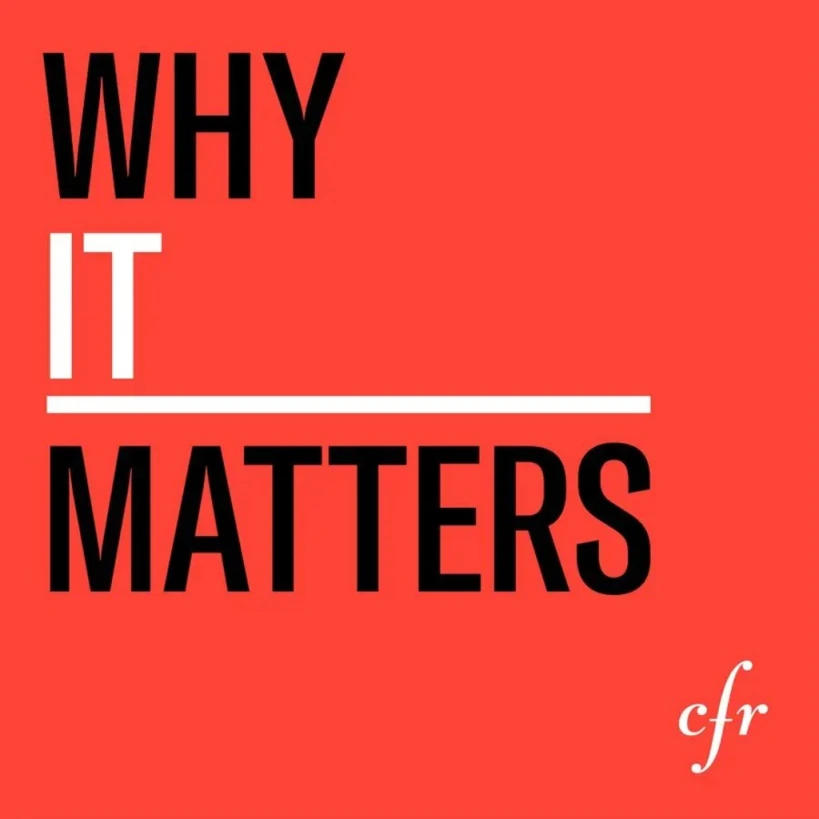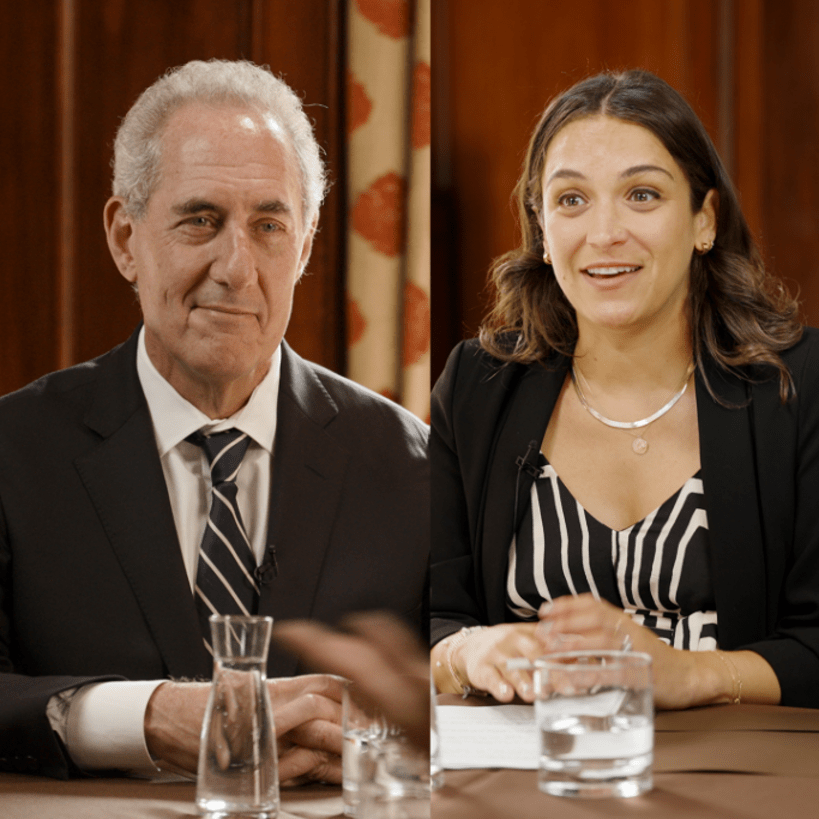Quantum Leap
How can the world create better medicines? More powerful solar cells? New batteries? The answers could come from a revolutionary research tool known as the quantum computer. It can seem like magic—harnessing the power of quantum physics to tackle the world’s most pressing challenges. But there are unmitigated risks too, as the technology continues to develop. What would a quantum-led future hold?
Published
Host
- Gabrielle SierraDirector, Podcasting
Author
- Shohini GhoseQuantum Physicist and Professor, Physics and Computer Science, Wilfrid Laurier University
- Marissa GuistinaQuantum Electronics Engineer and Research Scientist, Google
- Kate WeberPublic Policy Lead, Quantum Computing, Google
Supervising Producer
- Asher RossLead Content Strategist
Audio Producer and Sound Designer
Associate Podcast Producer
- Rafaela Siewert
Show Notes
Quantum computing could solve the world’s toughest challenges. The technology is still in its infancy, but some experts suggest it will change the course of scientific research, in areas such as chemical and biological engineering, climate change responses, and financial forecasting. But the quantum revolution isn’t around the corner, and there are many threats to neutralize. So, how could this technology alter society, and will that ever come to pass?
From CFR
Lucas Ashbaugh, “The Quantum Race the United States Can’t Afford To Lose,” Net Politics
Robert Morgus and Justin Sherman, “What Policymakers Need to Know About Quantum Computing,” Net Politics
Read More
Cade Metz, “Yale Professors Race Google and IBM to the First Quantum Computer,” New York Times
Kevin Allison, “Why quantum computing could be a geopolitical time bomb,” GZERO Media
Patrick Caughill, “World’s Leading Physicist Says Quantum Computers Are ‘Tools of Destruction, Not Creation’,” Futurism
Shlomi Dolev, “The quantum computing apocalypse is imminent,” TechCrunch
Sophie Bushwick, “New Encryption System Protects Data from Quantum Computers,” Scientific American
Stephen Chen, “China launches world’s fastest programmable quantum computers,” South China Morning Post
Susan Decker and Christopher Yasiejko, “Forget the Trade War. China Wants to Win Computing Arms Race,” Bloomberg
Watch and Listen
“Demonstrating Quantum Supremacy,” Google
“Google’s Plan To Create The World’s First Quantum Computer,” Simply Tech
“How do quantum computers work?,” Interesting Engineer
“Quantum Computers Explained – Limits of Human Technology,” Kurzgesagt
“The Race For Quantum Supremacy,” Vice News
Transcript
We think we live in a world with one set of physical rules. If I’m holding an apple and I let it go, it will fall to the floor.
But at the smallest scale - inside of molecules and atoms - there’s another world, where normal rules of physics cease to exist. A world where gravity operates differently, where a single particle can be in more than one place at a time. This is the quantum world. And it is happening all around us.
Avengers Endgame: The Quantum realm is like its own microscopic universe. To get in there you have to be incredibly small.
Neil deGrasse Tyson: Particles pop in and out of existence. You try to measure it and it is not there anymore, but you saw it there a moment ago.
Richard Feynman: The behavior of things on a small scale is so fantastic, it is so wonderfully different, so marvelously different than anything that behaves on a large scale.
It’s kind of like magic, but real.
And right now, research teams around the world are in the process of harnessing this magic to build quantum computers. And that means that you and I, dear listener, are living during the start of a technological revolution, just like the space age, or the nuclear age in the past. Some experts believe that a useful quantum computer could be complete in just a decade. And when they are ready, certain calculations that would take tens of thousands of years on a regular supercomputer could be solvable in minutes.
Quantum computers will change the world. And we are only just starting to ask the right questions about what that will mean.
I’m Gabrielle Sierra and this is Why It Matters. Today, de-mystifying quantum computers.
Shohini GHOSE: Quantum computers are a completely different technology, they’re a whole new type of approach to doing computing. And for that, we need to rethink what we even mean by computing itself.
This is Shohini Ghose. She is a quantum physicist and a professor at Wilfrid Laurier University in Waterloo, Canada.
Marissa GIUSTINA: Imagine you live in a chess board or a checker board and your rule set is that you can only move on horizontal or vertical axes.
And this is Marissa Guistina. She’s a research scientist and quantum electronics engineer at Google.
GIUSTINA: You can go forward and backwards, left and right and that’s all you know and suppose you suddenly had access to another rule set that allows you to move on the diagonals, well, you’re going to be able to get from one to the opposite corner much faster if you live in the world that allows you to use diagonals than if you live in the world that only allows you to move up and down, left and right. In our everyday lives, we are accustomed to the rules of the way the world works. You drop something you expect it’s going to fall. Gravity’s going to pull it down. You don’t think about that. You take it for granted, but you could imagine that if you had access to another universe, if you will, with a different set of rules, you might be able to build different tools, and quantum computing is just that. It’s the idea that maybe if we climb into the set of rules given to us by quantum mechanics, we could build a tool that behaves totally differently from the tools in our everyday world that maybe is better at solving some problems.
SIERRA: It’s like a multiverse.
GIUSTINA: Oh, let’s not get an to multiverses. Yeah.
SIERRA: You’re like, “Please don’t say that.”
GIUSTINA: Then we get into conflicts between different interpretations of quantum mechanics and it gets very philosophical.
SIERRA: Oh, my God. Okay. I don’t want to start a rumble in the quantum mechanics community, please. I’ll back it up.
Listen, if there’s one thing that I can tell you from making this episode, is that if it’s quantum, it’s confusing. But one of the best ways to understand what quantum computers are for is to compare them to the standard computers that we’re all used to.
GHOSE: So standard computing is actually pretty easy because everything boils down to combining zeros and ones.
Regular computers think in a binary system using something called bits. Bits are sort of like switches, and at any given time, they can either be a zero or a one. That’s it. Everything your computer does happens because it is working its way through millions of these zeros and ones.
GHOSE: All information, whether you’re writing emails, or doing some fancy calculation to launch a rocket ship to Mars, all calculations and information and data are just zeros and ones. But with quantum computing, the idea is that we move away from restricting ourselves just to zero and one, because if you think about it, that’s a pretty small space to start computing in. Instead if we can expand and think about combinations of zeros and ones where you have some probability of being zero and some probability of one, then that opens up a much broader range. And it’s a little more fuzzy of course, because we’re not talking about precision zeros and ones. But on the other hand, you can think of it as a much larger landscape to play in.
Quantum computers aren’t constrained by the binary system of bits.
Instead, they use something called qubits. Rather than being a zero or a one, a qubit can be in both states simultaneously. If you’re scratching your head right now, you are in good company. But one way to say it is that quantum computers use the strange behaviors of sub-atomic particles to solve problems.
SIERRA: So what type of sectors, or I guess people, will be using quantum computers?
GHOSE: It’s hard to predict where technology can be applied, but we do know very specific kinds of algorithms that a quantum computer would provide advantages for. So let’s say if you want to simulate the behavior of a molecule for drug development, that’s a quantum simulation, obviously you’d want to use a quantum computer.
GIUSTINA: You could almost think of a quantum computer and as being a little bit like a programmable molecule. If a chemist wants to model a molecule really fully and they want to use a classical computer, there’s a pretty low limit as to how large that molecule can get before we just can’t even run the simulation anymore. The number of parameters that you have to keep track of gets really big, but that same kind of complexity that the molecule has that’s difficult to model with a classical computer is actually built into the quantum computer. It’s because of the quantum mechanics that it’s difficult to model classically. So you could almost say that the dynamics of the molecule are the native language of the quantum computer.
Right now, if you want to create a new treatment for, say, Alzheimers, or Covid, you have to conduct real-life experiments in a lab for months or years. But with quantum computers, you could potentially simulate many of those experiments in minutes or hours, by creating exact models of the molecules that make up things like organs, blood cells, or brain tissue. Experts are very conservative about projections, but these types of simulations could lead to faster breakthroughs.
GHOSE: But that’s only one application of quantum simulation. You can certainly use simulations to develop let’s say better solar cells, which are also based on quantum properties of things like how you can develop materials that can absorb energy more efficiently and can store energy, building better batteries, all of this. And that of course relates to things like even transportation, because then you can talk about electric vehicles and things like this.
Kate WEBER: One could imagine modeling the chemical reactions required for nuclear fusion for fusion energy, which to Marissa’s point, would be transformational for climate change.
We also spoke to Kate Weber, she works with Marissa, but on the policy end.
Kate WEBER: Do you want to start here Marissa? I’m sure Marissa has thoughts that she…
She is a Policy Lead for Quantum Computing at Google.
WEBER: I did a PhD in molecular biology. If I had been able to model protein interactions, a lot of the work that I needed to do and spent countless hours in the lab doing would become kind of unnecessary. I could just have predicted the results using a quantum computer, so.
GHOSE: There’s a whole general area around optimization, finding the best solution or the maximum or the minimum of functions. Now, that sounds very mathematical, but in the real world, what that means is that the best solution could be, let’s say, the best transportation route for food supplies around the world. By the time they come online, they will be able to impact so many different areas of our society. Whether we’re talking, as I said, security or healthcare, or even climate change questions, anything that involves large amounts of information processing for certain types of algorithms would be open to the use of quantum computers, but also perhaps in ways that are unexpected.
Functional quantum computers could fundamentally alter any field or industry. Finance, city planning, weather forecasting - you name it!
SIERRA: Will there ever be a day, you know, in the future when everyone is walking around with a quantum computer in their back pocket?
GIUSTINA: You can’t think about a quantum computer as something that will ever replace a classical computer. It’s a piece of additional hardware that helps your computer do something that it could otherwise never do, but that aid alone is not the whole picture. So quantum computers, for example, are not very good at counting or arithmetic. Those are tasks that are really best left for the standard classical computer, but there are other problems like chemical modeling, for example, that are simply impossible for a classical computer by itself, and when partnered up with a capable quantum computer, then the real magic happens. A way to think about this could be that imagine we’re trying to develop new means of transportation and we want to get to the moon. Okay, we know we’re going to need to develop some pretty crazy technology to get to the moon, time goes on, we invent the rocket, we get to the moon, hooray, but that doesn’t mean that we now take rockets everywhere. If you want to go to the grocery store, your bicycle is still a better bet than the rocket. And similar with a quantum computer, we’ll need that rocket in order to solve certain kinds of problems, but it’s not going to replace all of the other very effective computation tools that we rely on.
SIERRA: Can you give me a picture of what a quantum computer looks like?
GHOSE: I can give you a picture of a type of quantum computer. What’s interesting is that the technology is so new that we don’t even know what it will actually be based on. Will it be based on the solid state technologies that we already have, for example, semiconductor kinds of approaches and materials, or will we be using laser beams and photonics, or in fact, some of the earliest approaches to quantum computers was in liquid form because these were-
SIERRA: Whoa.
GHOSE: Yeah, these are molecules that were in solution that were being controlled. So that’s how big the range is of what you can visualize, maybe at which it’ll be in the form of a test tube.
SIERRA: Wow.
GHOSE: Who knows.
SIERRA: Yeah.
SIERRA: So these computers are already up and running?
GHOSE: Well, quantum computers, they do exist in the sense that IBM for example, has a working quantum computer, Google has one, and there are also new startups that are building their own hardware. But this is sort of like saying we have computers back in the days in the ‘60s, if you look up history books or Google the earliest computers, you’ll get these photos of rooms full of these dials and switches and-
SIERRA: Totally like a whole room, very loud. Yeah.
Remington Rand Univac: In the heart of the Univac, the electronic central computer, capable of making over 2000 mathematical calculations per second.
GHOSE: You know, when we see those photos, we think of that as kind of primitive computers. And now we have super high tech, cool gadgets. So I’d say that quantum computers that do exist today are kind of like those old ‘60s-style, regular computers.
GIUSTINA: Some of the initial interesting quantum computing started in the 80s and ‘90s and really just kind of daydreaming about what would it look like, but we also found that actually implementing that hardware is extremely difficult, because of course we’re trying to build something that doesn’t behave according to our everyday rules. So actually very early on, it was found that quantum information is fundamentally error prone, you’ve got your quantum computer in some state and then it just goes poof and isn’t there anymore, and in order to get around that we need a technology known as quantum error correction. Any useful quantum computer is going to be robust against these kinds of errors. So now we’re talking about needing millions of physical qubits, and right now we’ve demonstrated something on the order of tens to a hundred of physical qubits. So we’re not only a ways away in terms of the number of physical qubits that we need to make, but also the performance that we need to see. So that’s a ways out, but I will say that not too long ago, we were saying, “Oh, it was 20-year out technology.” It was perpetually 20-year out technology. Now it’s around a decade, so we’re definitely making progress, but there’s also a lot of progress still to come.
With any new technology, of course, there is the potential for misuse and risk.
2001: A Space Odyssey: I know that you and frank were planning to disconnect me and I am afraid that is something I cannot allow to happen.
Yeah no not that kind of risk. More like this:
TED, Vikram Sharma: And when quantum computers arrive, in the next 10 - 15 years they will even more rapidly crack the complex mathematics that underlies many of our encryption systems today. Indeed the quantum computer is likely to turn our present security castle into a mere house of cards.
WEBER: The one very concrete risk that there’s been a lot of focus on is the predicted ability of quantum computers to break RSA encryption and there’s a lot of work happening now to get ahead of that. The U.S. National Institute of Standards in Technology is running a standards process to develop standards for post quantum cryptography. Now these are cryptographic algorithms that use classical computing, but are expected to be resistant to quantum computers. That is one specific risk that important to think about and address now, because there is a possibility that adversaries could download large amounts of encrypted information, store it for 15 years and then when we have a fault tolerant quantum computer that can break Shor’s algorithm, which is what would break RSA encryption, they could then decrypt that information. And if it’s still important that it be kept secret in a couple decades, it’s sort of important to think about protecting it now.
GHOSE: So a decade or two sounds like a long time, but if you think about one thing, for example, that we are all learning, especially now during the pandemic, to be very careful about is healthcare, as well as healthcare records and our information. And if you think about the average person’s healthcare records, they don’t expire in a month or two months. We’re talking about a lifetime. So 10 or 20 years may seem like it’s a long time, but imagine if let’s say 10 or 20 years from now somebody turns on a quantum computer and can hack every single one of your passwords and take a look at all of your private data, for everybody around the world, that would be kind of bad. And so if that is even a possibility now, we should be thinking about it now and caring about it now, meaning how do we protect against that kind of situation, who gets to control that kind of technology, what else can you use these kinds of quantum computers for?
SIERRA: So I’d love to pivot back a bit to policy. So what are the biggest ethical or policy concerns when it comes to quantum computing?
WEBER: So without knowing exactly what the really powerful applications for quantum computing are going to be, it’s really difficult to identify what the biggest ethical concerns will be. But we can say that they’ll come in a couple of buckets. And, I think when people think about this now and say ethics, they actually are talking about two things. One is, what are the applications for quantum computing that raise concerns? And, then the other is related to this access question, who has access to this technology and will it further existing inequalities in access to this to technology? So on the first, the lack of knowledge about what the applications will be, means that it’s challenging to address now. One of the reasons that I think we see so much policymaker focus is there is a belief that there will be some defense-related applications for the technology and, of course, that’s where our view is that these frameworks for thinking about emerging technology deployment will become important as these applications begin to be discovered.
We spoke to some experts about this and there are national security concerns. Again, the biggest issue is the predicted ability of quantum computers to break existing encryption.
It’s not just our personal data at stake, quantum computers could also be powerful tools for cyberwarfare. And there are other concerns too - they could be used to develop counter-stealth technology, anti-submarine technology, military AI, and could even be used to model more advanced nuclear weapons.
But, just like in the civilian world, the exact military and security implications are not yet understood.
At the other end of the spectrum, there are different policy concerns. For example, who might get left out of the quantum moment?
WEBER: On the access piece, it’s also important that we think about reaching communities that are less likely to have the resources to access quantum computers or even through education outreach efforts. Government funding is super important here, both at the undergraduate, graduate education level, but also the government has something called the “Q12 Partnership,” which is focused on exposing even kids, school-age kids to at least quantum computing and quantum technologies as a concept, the thinking being that the earlier you broaden the pipeline, the more likely you are to get people from underrepresented groups interested.
GIUSTINA: Yeah, I was waiting from when I was three.
SIERRA: So that’s right. Yeah. That’s funny.
WEBER: I don’t think we’ve discussed the preschool audience yet, Marissa, but I could try it out on my two-and-a-half and five-year-old.
SIERRA: There you go.
WEBER: We have this Quantum Computing for Babies book, actually, so..
GIUSTINA: I had seen that.
SIERRA: So obviously, you both work at Google, but are there other companies that are working on this? I mean is this also something that the U.S. Government is working on as well, whether in partnership with private companies or within the government?
WEBER: There are several other large tech companies that are developing quantum computers too. There are Amazon, Microsoft, IBM. Also, a lot of U.S. startups, several of whom have recently gone public or will go public soon. So in terms of US government investment, they are not, as far as we know, directly funding large-scale quantum computing hardware development in the way that these other companies are. But the government does provide a lot of R&D support from quantum computing and other quantum technologies, mostly through the National Quantum Initiative, which was signed into law in 2018.
The National Quantum Initiative is an Act of Congress. It gives the United States a plan for advancing quantum computing in the name of safeguarding national and economic security.
SIERRA: So what other countries are working on this?
GHOSE: I think by now almost every major government or conglomerate is looking into quantum kinds of applications and technologies. So the U.S. has certainly announced a couple of rounds of multi-billion dollar funding for this on the research sector side. India has announced funding. The European Union has its own funding. China has huge amounts of funding that they’re pouring into it, which dwarfs everybody else.
Many see the US’s biggest quantum competitor as China. And right now, China is building a $10 billion quantum supercenter.
DW News: China has announced their development of the power quantum computer in the world, President Xi Jingping has said that research and development in quantum science is an urgent matter of national concern and the country has invested heavily in this technology. It has become a world leader in the field.
WEBER: There is definitely a competition. A lot of the policy conversations these days certainly have a geopolitical competition lens behind them. In the U.S., of course, there is a big focus on the competition with China and we’ve seen impressive results coming out of China in the past couple of years. You know, it’s clear that they’re putting huge investments into the technology, they’re making a lot of progress. It is something that I think we need to be really careful that these geopolitical concerns don’t stifle scientific collaboration. As we’ve been emphasizing throughout this conversation, we are at a very early stage in this technology. It’s really still at the fundamental research stage, and one thing that we know is that collaboration is super important for advancing fundamental research. So, you know, policies that can foster collaboration amongst like-minded countries to more quickly realize the impacts of quantum computing, I think, are super important. As somebody who has worked in science policy, I mean it’s at the heart of the broader U.S. approach to research and innovation, and it’s what has established us as a leader. I think we don’t want to lose that.
Every country wants to get ahead in the quantum game, but too much emphasis on competition and secrecy could stifle progress. Part of the balancing act is prioritizing security while also working with the brightest minds abroad, and when possible, bringing those minds to the U.S. through smart immigration policy.
GIUSTINA: It’s already hard to recruit. We already are kind of low on experts, and that is a big critical piece of being able to develop the technology, so any way in which we restrict ourselves is a hindrance. We really need to be able to access as many brains as possible and nurture and nourish as many brains as possible to make them available for this kind of technology development.
SIERRA: As we think about who is at the table, as this gets built, I sort of want to pivot to something else and ask you about it. Much of the STEM world is still dominated by men, AI, blockchain, you know everything. So we even did a whole episode about STEM and I, myself, spent a few years in tech. We’ve seen in the past what happens when technology is built by one relatively homogeneous group. So my question is do you think, or do you have concerns about that, that could be applied to the quantum computing space?
GHOSE: Yes, it’s already happening that the same homogenous group is developing the technology and yes, of course it’s an issue. So I was looking at some of the sort of founding boards and so on, the executive level membership and leadership of these companies. And it is shockingly homogenous, in the sense that almost every board I looked at was all white men. And that, on one hand, that’s not surprising, but on the other hand, it’s also depressing that it’s continuing the culture of what we already see in Silicon Valley, for example. There is more conversation, I will say, around these issues. People are trying to find ways to open up the field more and bring in a more diverse group for the workforce, but it’s slow. And until we have change at the leadership level, I don’t think these approaches will be anything more than token. And I see a lot of that happen.
There’s still time to shape quantum computing - who builds it, who has access to it, and how we protect ourselves and our privacy. Time to ensure that their enormous power is directed at the right problems, and includes everyone.
It’s all pretty exciting, also confusing, and a little scary, but exciting.
GHOSE: If we do build better technologies and we are at some point able to build structures and processes to be using and making these kinds of technologies accessible to everybody then I feel, of course, that could unlock a future that would be amazing. And I’d love to be able to be part of that.
SIERRA: You just make me excited about this. I really, you know, if podcasting doesn’t work out, I’ll start my new life as a quantum physicist.
GHOSE: Come on over anytime. Or maybe I’ll become a podcaster.
SIERRA: Exactly.
GHOSE: And where we go, we just do it together.
SIERRA: Yeah!
For resources used in this episode and more information, visit CFR.org/whyitmatters and take a look at the show notes.
Have a question or some feedback? Just feel like saying hi? Send us an email at [email protected].
Subscribe to the show on Apple Podcasts, Spotify, Stitcher, or wherever you get your audio. And if you are a fan, we’d love it if you could leave us a review. Ideally a good one, the more stars the better. It really does help us get noticed and we appreciate it.
Why It Matters is a production of the Council on Foreign Relations. The show is produced by Asher Ross and me, Gabrielle Sierra. Our sound designer is Markus Zakaria. Rafaela Siewert is our associate podcast producer. Our intern this semester is Roshni Rangwani.
Robert McMahon is our Managing Editor, and Doug Halsey is our Chief Digital Officer. Extra help for this episode was provided by Claire Felter.
Original music is composed by Ceiri Torjussen. Special thanks go to Richard Haass, Jeff Reinke and our co-creator Jeremy Sherlick.
For Why It Matters, this is Gabrielle Sierra signing off. See you soon!






